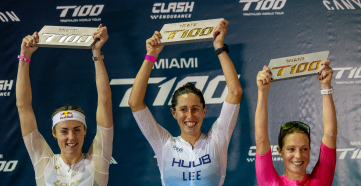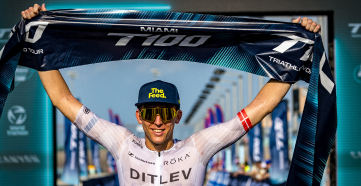Competing in major championships should be the pinnacle of an athlete’s career. But for many years, Cody Beals actively avoided them.
The 30-year-old Canadian star didn’t steer clear of the sport’s biggest events because he doubted his own ability. He literally could not afford to compete.
Cody has spent recent years shining a light on the financial struggles professional triathletes go through to test themselves at the highest level, even publishing detailed annual reports on his personal website.
There is no person better placed to give an educated take on the PTO’s decision to pay all 120 qualifiers (60 men and 60 women) who will take part in the PTO 2020 Championship at CHALLENGEDAYTONA® on December 6.

He described it as “nothing short of a revolutionary development for our sport,” adding: “All qualifiers are taking home at least $2,500. To put this into perspective, the margin between my triathlon-related revenue and expenses in my rookie pro season was barely $1,000.”
The decision to pay all qualifiers further boosts a landmark purse, which now totals $1,150,000. It also backs up the PTO’s desire to have the best race the best and elevate the sport to new levels. For the benefit of the athletes taking part.
Incentive to compete
“It gives all qualifiers an incentive to race, leading to one of the deepest elite fields ever assembled,” said Cody.
“This, in turn, elevates the profile of triathlon and the opportunities available to professional triathletes.”
This is all a far cry from the challenges he, and many others like him, have been forced to make during their careers. In Cody’s specific case, those early days included borrowing a car from his parents, arranging homestays instead of paying for hotels, and buying used equipment.
Not forgetting, of course, avoiding those Championship races…

“Early in my triathlon career, my first World Championship netted me nothing but expenses. I understood the risks when I signed up, but it was still disappointing and influenced my strategy going forward.
“I deliberately avoided Championship races for years. I worked instead on building my profile and making my living with more consistent results at lower-calibre races while missing out on some
valuable development opportunities.
“This story is all too common among the pro ranks.”
The PTO has made a concerted effort to boost prize pools throughout a COVID-ravaged 2020 season. And the showdown in Florida in December ramps that up a further level.
All-star field brings multiple benefits
Cody believes the all-star field will not only provide an enthralling spectacle for a global TV audience, he says it can also bring other positive spin-offs for the sport.
“Epic showdowns featuring deep fields are more exciting for fans, more enticing to business partners and media and more conducive to athlete development.”
This brave new world for triathlon, still in its infancy, is a seismic change from the very recent past. A point emphasised by Beals.
“When selecting race schedules, professional triathletes weigh the risks and rewards of various races.
“The amount and distribution of prize money is a critical variable. Typical prize purses at Championship races makes them extremely risky financial endeavours.
“Consequently, pros are often compelled to make unfortunate but pragmatic decisions to forego these larger events in favour of more dependable income.

“This is evidenced by relatively weak fields at some so-called ‘Championship’ races and significant rolldown of qualification slots.”
The PTO’s latest move is clearly having the desired impact already – it has made one of those previously difficult decisions a no-brainer for the man currently ranked 19 by the body.
He said: “Policies like this aren’t just charity for athletes; they ensure the long-term viability and development of our professional sport. I’m grateful to have such a forward-thinking organisation looking out for our interests.
“Before this announcement, I was even thinking twice about extending my season another month to gamble on an insanely competitive race at Daytona.”

















